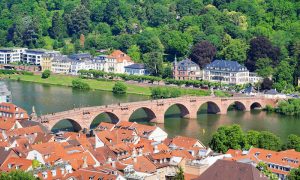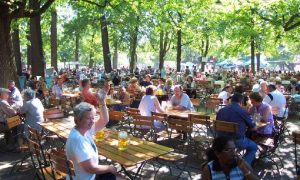As global competition for skilled personnel intensifies, Germany has adopted a series of technologicalimmigrantsThe policy attracts international talent, especially those working in highly skilled fields. If you have a specialized background and experience in a specific industry, theskilled migrantIt could be you.Immigration to GermanyThe ideal way to do this. In this article, we will explainSkilled Migration to GermanyThe list of popular occupations and the application process will help you to quickly move on to a new life in Germany.
One,skilled migrantList of popular occupations
The current demand for highly skilled people in Germany is centered on the following areas, which are classified as the following occupationsShortage occupations (Mangelberufe)This means that demand is high and applications are prioritized:
1. Information Technology (IT) and Software Development
- Occupation: software engineer, systems analyst, data scientist, cybersecurity specialist.
- What: Germany's digital transformation has created a huge demand for IT talent, especially in the areas of artificial intelligence and big data.
- Income: Typical annual salary is between Euro50,000 and Euro70,000.
2. engineering
- Occupation: Mechanical Engineer, Electrical Engineer, Automotive Manufacturing Engineer, Energy Technology Engineer.
- Characteristics: As an industrial powerhouse, Germany is a leader in the field of engineering, and the demand for skilled personnel remains high all year round.
- Income: Up to 45,000 to 65,000 euros per year.
3. Medical and Nursing
- Occupation: physician, nurse, geriatric caregiver, physical therapist.
- Characteristics: The aging population has made the health and care industry'sskilled migrantBecome a policy priority, especially experienced caregivers are in high demand.
- Income: Doctors earn more than 60,000 euros a year, nursing positions earn about 2,500 to 3,500 euros a month.
4. Natural Sciences and Research
- Occupation: Chemist, biologist, pharmaceutical specialist, materials scientist.
- Characteristics: Germany has a well-developed scientific research institute and pharmaceutical industry, which attracts a large number of international scientists.
- Earnings: Salaries are generally above Euro50,000 per annum.
5. Education and vocational training
- Occupation: Vocational education trainer, dual education consultant.
- Characteristics: The German model of dual education is very important for theskilled migrantof education and vocational skills training professionals open.
- Income: Approximately 2,500 to 4,000 euros per month.
Second, the main application process for skilled immigrants
1. Confirmation of whether the occupation is on the shortage list
The German Federal Employment Agency (BA) regularly publishes a list of shortage occupations (Positivliste). Applicants are required to ensure that their occupation is included in this list and that they meet the relevant qualification requirements.
2. Academic credentials (important)
- Certification Body: German Center for the Accreditation of Qualifications (ZAB).
- Accreditation process: Submit your diploma, transcripts and other documents to ensure that your qualifications meet German industry standards.
- artifact: The Anabin database can be used to check whether qualifications are recognized.
3. Find a job
- Job Search Channels: Utilize job platforms such as LinkedIn, StepStone, Xing, etc. to find jobs posted by German employers.
- Signing of work contracts: Applications for skilled migration must be accompanied by an official work contract from a German company.
4. language requirement
- German language skills: B1 level is required for certain positions, such as in nursing and education.
- English proficiency: Internationalized IT and engineering positions may accept English-speaking work environments, but mastery of the German language helps to better adapt to life.
5. Visa Application
The main visas for skilled immigrants include:

- EU Blue Card: The best option for high-income skilled people, requiring an annual salary of at least 48,000 euros (37,000 euros for certain shortage occupations).
- General Work Visa: For skilled immigrants whose annual salary does not meet the Blue Card criteria.
Required materials:
- valid passport
- Work contract or letter of confirmation from the employer
- Results of Academic Accreditation
- Language certificate (if applicable)
- Certificate of health insurance
III. Timeline for skilled migration
- academic qualification:: 3-6 months.
- Job Search and Contracting: 1-3 months (varies from person to person).
- Visa Application: 4-8 weeks (depending on the consulate).
The entire process usually takes 6-12 months to complete and advance planning is recommended.

IV. Advantages of skilled migration
- Fast track to obtaining a residence permit: Blue card holders can apply for permanent residence after 33 months, which can be shortened to 21 months with a B1 level of German.
- Family reunification facilitation: Spouses of Blue Card holders can apply for family reunification visas without proof of language proficiency and have employment rights.
- Wide range of career development opportunities: Germany has a steady demand for skilled personnel and offers migrants a platform for long-term development.
V. Tips for adapting to a new life after immigration
- Integration into workplace culture: The German workplace emphasizes efficiency and teamwork, so familiarizing yourself with the local way of working will help you adapt quickly.
- Learn German: Although many technical positions are predominantly in English, German is indispensable in everyday life.
- Participation in social activities: Join trade associations or interest groups to expand your network and deepen your understanding of German culture.
VI. Summary
Immigration to GermanyIt provides a wide space for highly skilled people to develop, especially applicants in shortage occupation fields can enjoy the priority policy. From confirming the list of occupations to submitting the visa application, each step requires careful planning and patient preparation. With the list of popular occupations and the detailed explanation of the application process provided in this article, you can get a clear understanding of the key steps of skilled migration and get ready to start a new life in Germany.
Whether you are an engineer, an IT specialist or a medical professional - if you meet the requirements and take action, the skilled migration path to Germany opens the door to success!






